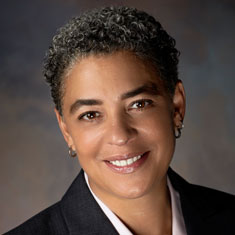Ann Cammett, Professor of Law, received her J.D. from CUNY School of Law and her LL.M. in Advocacy, with distinction, from the Georgetown University Law Center. At CUNY she directed the Family Law Practice Clinic from 2013 to 2017, until she assumed the position of Senior Associate Dean for Academic Affairs, serving until 2021. She has also taught New York Domestic Relations Law, First-Year Lawyering Seminar, and Poverty Law & Social Change. She was named Outstanding Professor at CUNY School of Law in 2017.
Professor Cammett’s scholarship explores the intersectional legal issues of race, gender, poverty, mass criminalization, and the family. She is a recognized expert on the policy implications of incarcerated parents with child support arrears and other collateral consequences of criminal convictions. Her work has been cited in two amicus briefs to the U.S. Supreme Court in the case of Turner v. Rogers and excerpted for family law casebooks, articles, and other treatises, and twice cited in the Federal Register.
After law school, Professor Cammett was awarded a Skadden Fellowship at the New York Legal Aid Society in 2000, where she represented formerly incarcerated women facing civil sanctions arising from criminal convictions. From 2004 to 2006 she served as the Reentry Policy Analyst for the New Jersey Institute for Social Justice, working to develop programs and advocacy materials to improve prisoner reentry outcomes. In 2006 she took a position as the Clinical Teaching Fellow in the Georgetown University Law Center’s Domestic Violence Clinic, supervising third-year law students in D.C. Superior Court, while also appointed as a Women’s Law and Public Policy Fellow.
Prior to joining CUNY, Professor Cammett was Associate Professor of Law at the William S. Boyd School of Law at the University of Nevada Las Vegas, where she was named Law Professor of the Year in 2011. At UNLV she taught Civil Procedure and founded the Family Justice Clinic, an innovative family law program with a particular focus on serving prisoners, their families, and other community members affected by the incarceration, the child welfare system, and other forms of state intervention.

